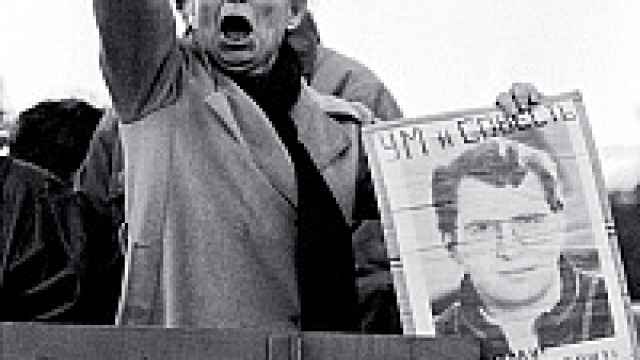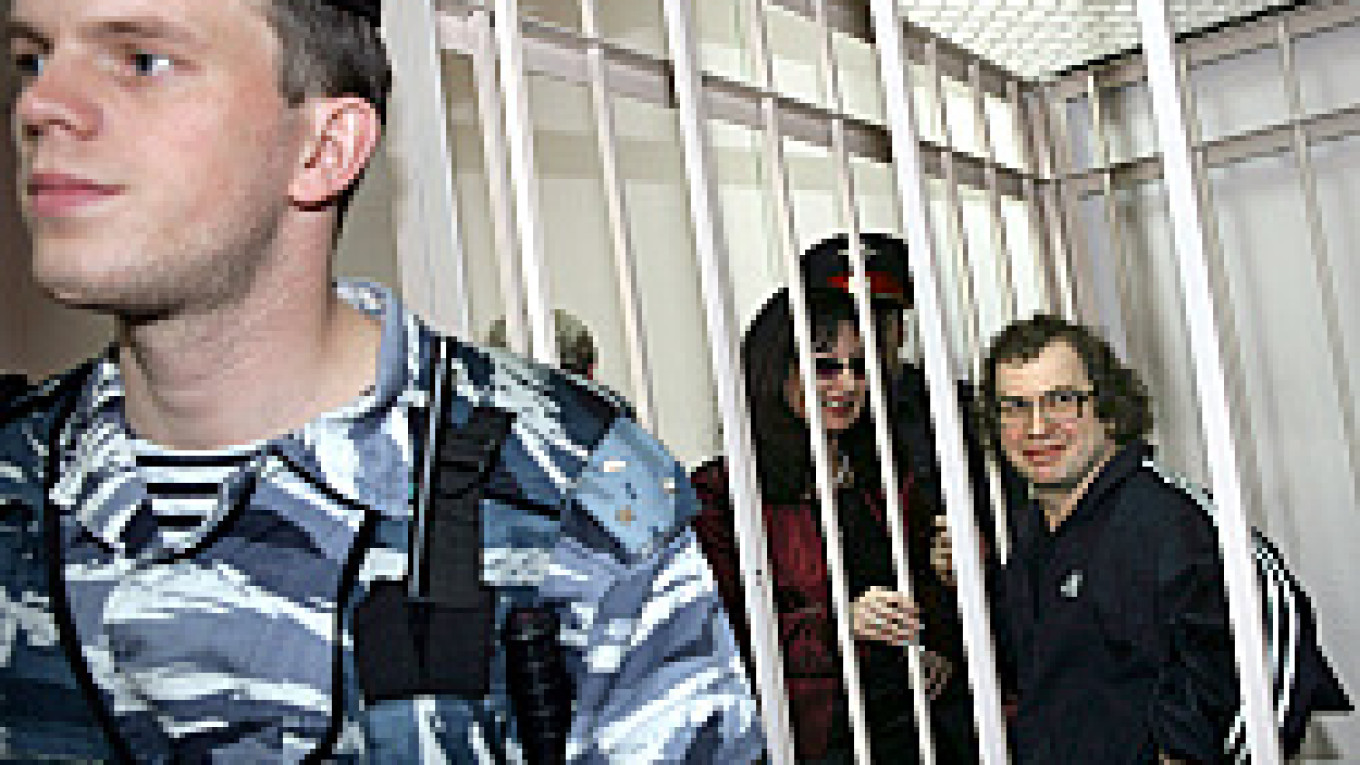Reading out the verdict Tuesday, Judge Nadezhda Markina of the Chertanovsky District Court said Mavrodi had defrauded MMM investors "by deception, betrayal and abuse of trust."
MMM was the first and the biggest in a series of financial pyramids that hit Russia in the 1990s. Mavrodi was found guilty of defrauding 10,000 investors out of 110 million rubles ($4.3 million), though in reality millions of people lost money in the scheme.
Markina is expected to finish reading the 820-page verdict later this week and to sentence Mavrodi on Saturday. Prosecutors have asked for a five-year sentence, but it is likely that Mavrodi will be released soon, as he has already spent four years in custody.
Mavrodi's lawyer Olga Makarova insisted that her client was innocent.
"We do not consider him guilty," Makarova said just before Markina began reading the verdict.
There is no article in the Criminal Code that applies to what happened to MMM, Makarova argued.
MMM, which operated from 1992 to 1994, was a sensation thanks to a clever saturation advertising campaign on national television that promised spectacular overnight returns on investments.
MMM's droll, 60-second television spots, featuring ordinary Russians whose lives improve drastically after they purchase the company's stock, captured the nation's imagination.
The advertisements' fictional heroes, Marina Sergeyevna and Lyonya Golubkov, became household names as MMM shares soared in value from 1,600 rubles (then about $1) to 105,600 rubles (about $65). Dividends were paid with money from new share sales.
Some 2 million to 10 million people lost their savings when the pyramid scheme folded in July 1994, and thousands of panicked people took to the streets. Investigators have estimated that Mavrodi made off with up to $100 million.
 Yevgeny Stetsko / MT A Mavrodi supporter at an investors rally in 1994. | |
About one-quarter of the district's voters were reported to hold MMM shares, and many shareholders believed Mavrodi's claim that MMM had been brought down by a government plot.
As a Duma deputy, he secured immunity from prosecution. A year later, however, the Duma stripped him of his seat, and thus his immunity, and the police resumed their investigation into possible fraud at MMM.
Mavrodi remained at liberty during the investigation, and in 1996 he tried to register as a presidential candidate.
The police closed their investigation in 1997, citing a lack of evidence. The Prosecutor General's Office reopened the case in 1998, and when prosecutors attempted to bring Mavrodi in for questioning, they found he had disappeared.
Although police initially suspected that Mavrodi had fled abroad, he was eventually arrested in his apartment in central Moscow in 2003 and has been in jail ever since.
The court on Tuesday was filled with the mainly elderly supporters of Mavrodi, most of whom had lost much of their life savings in his financial scheme. They, along with Mavrodi, were forced to stand while the verdict was read.
Mavrodi was given medical assistance after he collapsed two hours into the verdict while standing in the defendant's cage. None of his elderly supporters required assistance.
Despite their losses, the defrauded investors remain loyal to the bespectacled Mavrodi, an unassuming figure who was dressed in an Adidas tracksuit Tuesday and who looks like the computer salesman he once was.
"Let him go, he didn't kill anyone," said Marina Bolotova, 71, a former cleaner who lost tens of thousands of rubles when MMM crashed and complained that she had no money for her funeral. "They should put in jail those who caused this chaos."
Inna Novyush, 66, remembers vividly the panic in 1994 when people clamored to get their money out of MMM as it collapsed. She was near the front of the line on the day of the collapse and saw famous investors -- including Duma deputies and pop star Alla Pugachyova -- allowed to jump the line to cash in their shares first. Even though she was number 17 in line, she never got her money her back.
"There were shares everywhere in the metro" as people threw away the useless pieces of paper, said Galina Nepomnyashchaya, 61, who said she lost the equivalent of $5,000 in MMM.
Nepomnyashchaya, like the other hundred or so former shareholders inside and outside the courthouse Tuesday, were not there to vent their anger against Mavrodi. Many of them had their share certificates still with them. Nepomnyashchaya pulled out copies and explained that if they were linked to inflation, she would now have more than $387 million.
Novyush, 66, a retired children's doctor, still owes money to her neighbors, whose money she borrowed to invest in MMM. She nearly lost her home and had a heart attack because of the stress. But like other cheated investors, she blames the government for the collapse of MMM and has faith that a free Mavrodi would, as he has promised, "return the money."
"My conscience tortures me," Vladimir Permyakov, the actor who played Lyonya Golubkov, the hero of the famous television ads, told RIA-Novosti on Tuesday. "I would like for Mavrodi to be set free tomorrow so that he could set things right with the investors and remove the sin from himself and from us -- the actors who unwittingly became guilty by acting in the MMM advertisements."
Mavrodi told the court last year that if set free he would do his best to pay back investors, partially by cashing in his $1.5 million in shares of state-owned gas giant Gazprom.
If left to prison, however, Mavrodi said, "there can be no talk of returning the money," national media reported.
Mavrodi made no comment at Tuesday's session. Before the verdict, Mavrodi's lawyer displayed her client's latest book, "The Truth About MMM: Prison Diaries," which is on sale now.
A Message from The Moscow Times:
Dear readers,
We are facing unprecedented challenges. Russia's Prosecutor General's Office has designated The Moscow Times as an "undesirable" organization, criminalizing our work and putting our staff at risk of prosecution. This follows our earlier unjust labeling as a "foreign agent."
These actions are direct attempts to silence independent journalism in Russia. The authorities claim our work "discredits the decisions of the Russian leadership." We see things differently: we strive to provide accurate, unbiased reporting on Russia.
We, the journalists of The Moscow Times, refuse to be silenced. But to continue our work, we need your help.
Your support, no matter how small, makes a world of difference. If you can, please support us monthly starting from just $2. It's quick to set up, and every contribution makes a significant impact.
By supporting The Moscow Times, you're defending open, independent journalism in the face of repression. Thank you for standing with us.
Remind me later.


